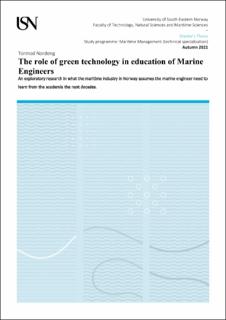The role of green technology in education of Marine Engineers
Master thesis

Permanent lenke
https://hdl.handle.net/11250/2835866Utgivelsesdato
2021Metadata
Vis full innførselSamlinger
Sammendrag
The maritime industry is a dynamic, international, and competitive industry with multiples actors.
It is also an industry with both national and international regulations and laws, as shipping is a global activity.
To stay competitive in the maritime industry it is of importance to think strategy, be innovative, follow regulation and s laws, and be willing to take risks.
Like a shipowner, the academia must “steam forward” to be relevant for the maritime industry to produce marine engineers with the right, green technology competence to operate the fleet the next decades.
The world is in change and the UN’s goals for 2030 and 2050 demand new, green technology with environmental-friendly solutions for shipping, and this requires competence by the people operating these ships.
I have done an exploratory research in a selection of the Norwegian maritime industry to find out what they assume and expect by the marine engineer with bachelor’s degree the next decades.
The interviewers have stated their answers based on their own knowledge, experience, and assumptions to operate low- and zero-emission ships.
To sustain competitive as an education centre, academia must be innovative and flexible in the way they teach their students, and a reframing of the study plan is suggested.
A continuous evaluating together with the students and the maritime industry on the study plan can contribute to make the academia relevant in many hence.
My research has shown that the maritime industry expects rapid changes in ship operations the next decades and in a much faster way than the laws and regulations can follow.
And therefore, it is relevant for the marine engineer to possess competence to approach new, green technology in the education.